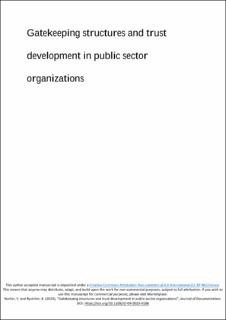| dc.contributor.author | Norkin, Svetlana | |
| dc.contributor.author | Byström, Katriina | |
| dc.date.accessioned | 2023-11-03T13:57:29Z | |
| dc.date.available | 2023-11-03T13:57:29Z | |
| dc.date.created | 2023-11-01T09:38:25Z | |
| dc.date.issued | 2023 | |
| dc.identifier.issn | 0022-0418 | |
| dc.identifier.uri | https://hdl.handle.net/11250/3100576 | |
| dc.description.abstract | This paper examines the interaction between gatekeeping and trust in a public sector organization, where employees at lower hierarchical levels are expected to autonomously translate and transform directives into public services. This requires them to have access to operational steering information; that is, information about directives and how to interpret and apply them. This study focuses on how gatekeeping structures regulate flows of operational steering information, and how the gatekeeping structures affect the development of trust. The research design is qualitative. The data material consisted of semi-structured interviews with 26 employees in home care and schools and of eight complementary non-participant observations. Thematic analysis revealed the existence of fixed and flexible gatekeeping structures, which characterize how arrangements of information sources and channels are organised as part of working. In recurrent and preplanned fixed gatekeeping structures, managers or domain experts typically act as gatekeepers, and employees also perform gatekeeping activities collectively. Unplanned, flexible gatekeeping structures cater for ad hoc information intermediation which are prompted by work situations that diverge from daily routines . Within these structures employees may more readily shift roles as gatekeepers or gated. Furthermore, the gatekeeping structures for intermediation of operational steering information may support or impede employees’ work, thus affecting their trust in their peers and their work organization. This study contributes conceptually by introducing gatekeeping structures and operational steering information, and empirically by providing evidence of their relationship to trust development in the public service delivery. Thus, it contributes to the research fields of information management and public administration. | en_US |
| dc.language.iso | eng | en_US |
| dc.publisher | Emerald | en_US |
| dc.relation.ispartofseries | Journal of Documentation; | |
| dc.rights | Navngivelse-Ikkekommersiell 4.0 Internasjonal | * |
| dc.rights.uri | http://creativecommons.org/licenses/by-nc/4.0/deed.no | * |
| dc.title | Gatekeeping structures and trust development in public sector organizations | en_US |
| dc.type | Peer reviewed | en_US |
| dc.type | Journal article | en_US |
| dc.description.version | acceptedVersion | en_US |
| cristin.ispublished | true | |
| cristin.fulltext | postprint | |
| cristin.qualitycode | 2 | |
| dc.identifier.doi | https://doi.org/10.1108/JD-09-2023-0186 | |
| dc.identifier.cristin | 2190831 | |
| dc.source.journal | Journal of Documentation | en_US |

